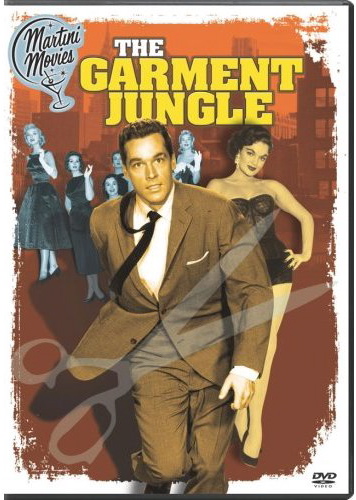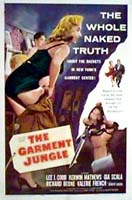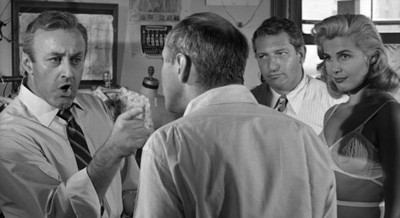| Release List | Reviews | Price Search | Shop | Newsletter | Forum | DVD Giveaways | Blu-Ray/ HD DVD | Advertise |
| Reviews & Columns |
|
Reviews DVD TV on DVD Blu-ray International DVDs Theatrical Reviews by Studio Video Games Features Collector Series DVDs Easter Egg Database Interviews DVD Talk TV DVD Talk Radio Feature Articles Columns Anime Talk DVD Savant HD Talk Horror DVDs Silent DVD
|
DVD Talk Forum |
|
|
| Resources |
|
DVD Price Search Customer Service #'s RCE Info Links |
|
Columns
|
 |
The Garment Jungle |

|
The Garment Jungle Sony 1957 / B&W / 1:85 anamorphic widescreen / 88 min. / Street Date Septermber 23, 2008 / 19.94 Starring Lee J. Cobb, Kerwin Mathews, Gia Scala, Richard Boone, Valerie French, Robert Loggia Cinematography Joseph Biroc Film Editor William A. Lyon Original Music Leith Stevens Written by Harry Kleiner from articles by Lester Velie Produced by Harry Kleiner Directed by Vincent Sherman |
Depending on which sources one believes, there's a hot Hollywood story behind The Garment Jungle. The feisty independent Robert Aldrich was the film's original director, and it has often been reported that Columbia showed him the door after mogul Harry Cohn realized out that it was Aldrich who produced and directed The Big Knife. That 1955 movie has Rod Steiger in the role of Stanley Hoff, a vulgar, brutal studio head supposedly modeled after ... Harry Cohn.
The Garment Jungle tries hard to be a tough story about union-busting mobsters muscling in on New York's garment industry. It wishes it were the sweatshop equivalent of Elia Kazan's dockworkers' union epic On the Waterfront from three years earlier. The film instead comes on as an okay thriller somewhere between Columbia's hard-hitting Phil Karlson movies (Tight Spot, The Brothers Rico) and the studio's lesser "city exposé" cheapies (Miami Exposé:, Inside Detroit, The Houston Story) written by Robert Kent. Producer Harry Kleiner's script doesn't shy away from depicting the tough methods used to terrorize the garment workers' union, but its avoids the real issues by pointedly pinning the blame on obvious bad guys. New York location filming was reportedly interrupted by a threat delivered by a "menacing but polite criminal type."
The Garment Jungle conceives of labor issues on terms almost as simple as the German classic Metropolis: The bosses of the world just need to be enlightened, to perceive of their employees as partners instead of enemies. Walter Mitchell goes to a gangster instead of an alchemist to keep the rabble where they belong, but the intervention of his son shows him the error of his ways.

In their book What Ever Happened to Robert Aldrich? Alain Silver and James Ursini tell the real story of the making of The Garment Jungle. Aldrich prepared the film and hired the cast (which includes many of his regulars) but ran into script resistance from his star Lee J. Cobb. Cobb didn't like the way Aldrich was "hardening" his character and the shoot was an unhappy one. Aldrich fell sick five days before completing the shoot, and was replaced by Vincent Sherman -- who proceeded to re-shoot scenes for a full nine days, presumably softening the Walter Mitchell character. Sherman didn't want screen credit but Harry Cohn gave it to him anyway.
As completed, it's difficult to believe that much of the movie was filmed in New York; we see a few night street exteriors but most of the movie plays out in cheap interior sets, like the one for the rather claustrophobic Mitchell Dress Company. The lighting is unimpressive but Aldrich puts considerable menace into his scenes of violence. A man is killed in a falling elevator and another is stabbed to death in an alley. A labor leader (Willis Bouchey) is shown to have ugly scars on his face from acid. Adam Williams and Aldrich favorite Wesley Addy are a pair of overstated hit men. Union organizers Robert Loggia and Joseph Wiseman have the most interesting roles; one is martyred and the other reduced to trembling fearfulness.

This is definitely one of Kerwin Mathews' better pictures, but Lee J. Cobb has difficulty with a role that expects us to accept him as brilliant in business and rather stupid at the same time. The script's idea of sensation is to end a design argument over fabrics with Cobb tearing a dress off of a model. It makes a great trailer shot but is unintentionally funny; the film thinks it's exciting for the "serious dressmakers" to work around half-naked women without even acknowledging them. A long list of statuesque actresses plays the models as if they were furniture -- Joanna Barnes, Marilyn Hanold, Betsy Jones-Moreland, Laurie Mitchell. Why Columbia execs green-lit this one is obvious.
Valerie French has the thankless role of Cobb's girlfriend -- we wonder if the part was added in the nine days of retakes to humanize Walter Mitchell. The big surprise is Gia Scala, a Universal "discovery" best known for The Guns of Navarone. Scala is much more vivacious and warm here than in pictures like The Tunnel of Love; she and the talented Robert Loggia make an excellent Italian-American working couple, comparable to the one in the anti-Capitalist labor film Christ in Concrete.
The Garment Jungle ultimately proves itself as gutless as any 50s Hollywood movie on a controversial subject. The movie is firmly on the side of the unions but doesn't acknowledge that organized crime was behind union busting. Richard Boone's hissable Artie Ravidge is far too obvious, and his eventual move to take over the Mitchell Dress Company is a completely independent action. The biggest insult is that we're expected to believe that Lee J. Cobb's Mitchell approves of Ravidge's rough enforcement methods, yet is shocked (shocked, I tell you) to discover that people are being hurt and sometimes killed. The way this movie ends now, it suggests that the problem of American labor would be solved if criminal terrorists were a little less murderous. Perhaps this problem was the basis of the dispute between Cobb and Aldrich.
Sony's DVD of The Garment Jungle comes in a handsome enhanced B&W transfer with zero damage; the soundtrack flatters Leith Stevens' emphatic score. Forget the two "Martini Minutes" - themed extras, as they're really insubstantial promos for other films in the series ... some of which are very desirable. An original trailer is the disc's one real added value extra.
On a scale of Excellent, Good, Fair, and Poor,
The Garment Jungle rates:
Movie: Good
Video: Excellent
Sound: Excellent
Supplements: Trailer
Packaging: Keep case
Reviewed: September 19, 2008
Reviews on the Savant main site have additional credits information and are more likely to be updated and annotated with reader input and graphics.
Review Staff | About DVD Talk | Newsletter Subscribe | Join DVD Talk Forum
Copyright © MH Sub I, LLC dba Internet Brands. | Privacy Policy
Subscribe to DVDTalk's Newsletters
|
| Release List | Reviews | Price Search | Shop | SUBSCRIBE | Forum | DVD Giveaways | Blu-Ray/ HD DVD | Advertise |





